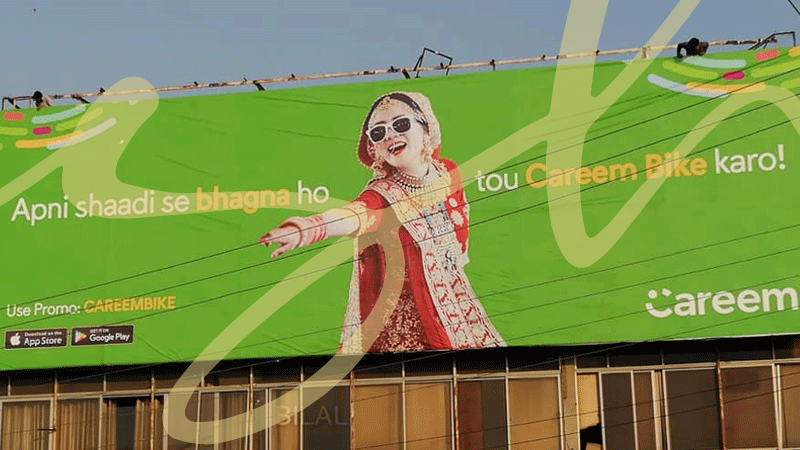
A few days ago popular ride-hailing app Careem was in the spotlight for an advertisement that commentators said was damaging to Pakistani ‘culture’.
Careem’s ad, which made its appearance in Lahore, featured a woman dressed in wedding attire with a caption reading: “Apni shaadi se bhaagna ho tou Careem bike karo!” (If you want to run away from your wedding, book a Careem bike!).
Once a snapshot of the ad was posted on social media the backlash was swift. Actress Veena Malik said: “Careem should take this nefarious ad down right away… and apologise!” Others said that “Careem is now encouraging brides to run away from their shaadis”.
Careem couldn’t even escape the now ubiquitous phenomenon of ‘fake news’ – soon after the advertisement went viral, trolls on social media began sharing a picture of Careem’s CEO meeting with the interior ministry, claiming that the interior ministry had summoned Careem to take the company to task for the advertisement.
This was not true, and the image circulating on social media was actually a photograph of a meeting that took place on January 23rd. “The meeting between Careem and the ministry of interior took place in January and on a different subject matter,” clarifies a Careem representative. “We haven’t had any official contact with the ministry recently.”
A petition has also been filed at the Lahore High Court, stating that the ad is an “unethical promotional campaign” and “unconstitutional as Pakistan is an Islamic country.
All this drama begs the question: Is our ‘culture’ really so fragile that an advertisement can damage it? And while we’re at it, in our fast-changing, rapidly urbanising country, who gets to define what our ‘culture’ is anyway?
Careem has had a tradition of using trending topics to create ads, much like popular eatery Nando’s has done in the past. Careem has used the concept of ‘rishta aunties’ to create special rides, and has also offered promo codes poking fun at the 2018 general elections.
This time, however, Careem was taking a hit at a very real problem in Pakistani society: forced marriages. Seen another way, the ad wasn’t ‘encouraging’ women to run away from their weddings… it was a jab at our culture where women are often coerced into marriage because otherwise ‘log kya kehnge‘. Many commentators caught on to this after the initial backlash, sparking a conversation.
Just last month, police got wind of a case where a 15-year old girl alleged that her father forced her to marry a 45-year-old man who was already married and had four children. Last year in a landmark conviction, a British court on convicted a woman of deceiving her teenage daughter into travelling to Pakistan to enter into a forced marriage.
Compunode.com Pvt. Ltd. (www.compunode.com).Designed for Dawn.